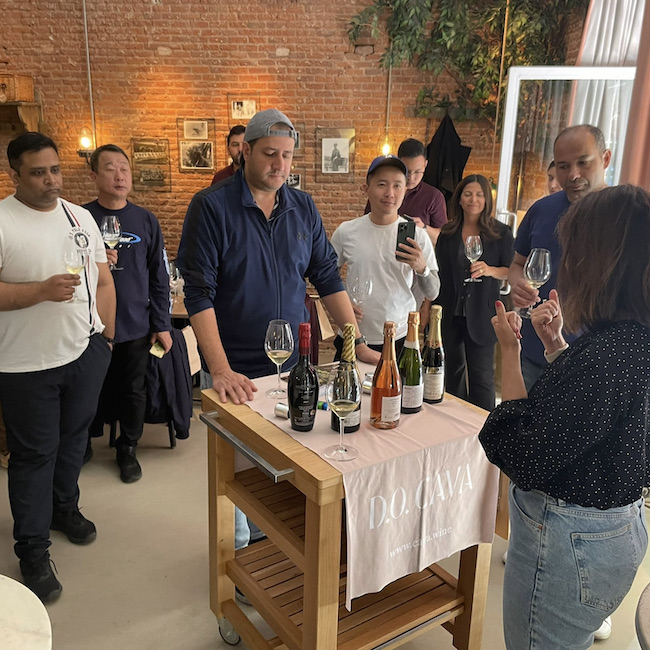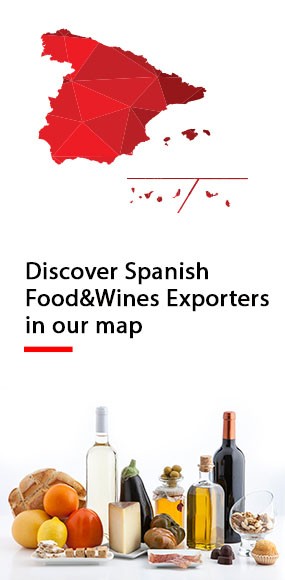.png.transform/rendition-xs/image_image%20(1).png)
An In-Depth Look at Hospitality Training Certificate
The annual edition of the Hospitality Training Certificate, a program organized by ICEX’s Foods&Wines from Spain Academy, has come to an end. Running from May 7th to the 19th, participants travelled through the Basque Country, Aragón, Valencia, and Madrid
The program primarily caters to executive chefs at prestigious international hotel chains and food and beverage directors, and aims to educate them about Spanish products and beverages. It’s organized into two parts: the first module is online and offered through the ICEX-CECO e-learning platform, while the second module consists of a 2-week visit to Spain.
Final Day of the Program
The program concluded with an address at ICEX, the graduation ceremony, and closing remarks. After a small reception, the participants headed home.
Steven Wong Chee Liang, Sous Chef from Hotel Hilton Kuala Lumpur, was on of the participants. He said that Spanish food “is the best he’s ever tried,” and he was especially impressed by the quality of the “Ibérico ham, extra virgin olive oil, and beef.” His favorite aspect of the Hospitality Training Certificate was being given the opportunity “to smell and taste Spanish food and to get an up-close understanding of it.”
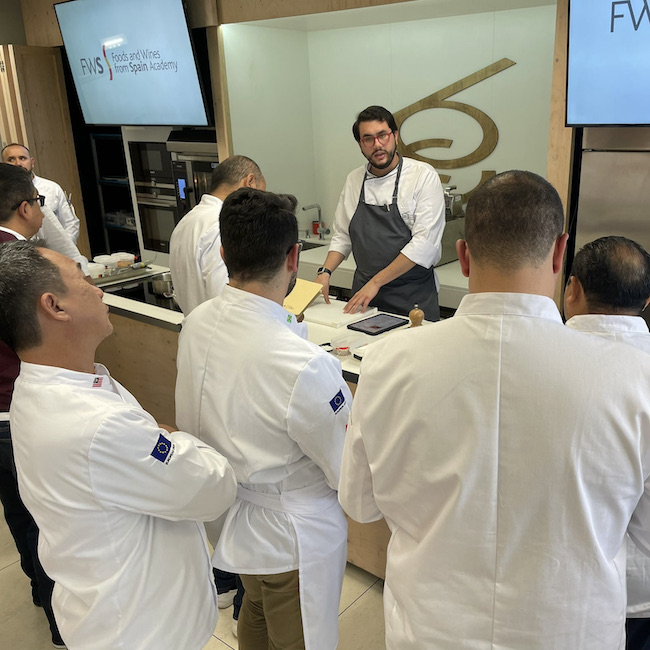
Participants Travelled to the Basque Country
The visit began with a stop at the Basque Culinary Center (BCC), a pioneering academic institution focused on training, innovation, research, and entrepreneurship in San Sebastián.
Participants attended 5 sessions and workshops over the course of the day addressing topics such as Spain as a brand product; new techniques in canned foods; Spanish wine; ham, cheese, and wine pairings; and products and techniques. Lunch was served at the BCC and, after the training, the group headed to Akelarre restaurant for a visit and cocktail demo. Dinner was served at Gronx Zurriola restaurant.
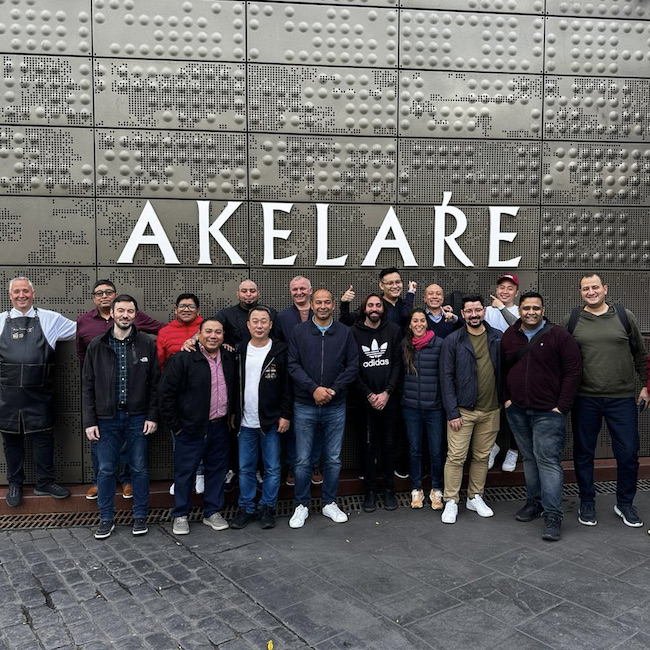
Second stop: Aragón
The next three days of the program were organized by Aragón Exterior, the region’s foreign trade and investment promotion agency.
The group traveled from Donostia to Pamplona and enjoyed lunch at La Olla restaurant. From there, they headed to Moncayo for an olive oil tasting hosted by a top local producer at Veruela Monastery.
This extremely unique setting is located on Moncayo Mountain. The monastery was built in the 12th century by Cistercian monks, who produced oil and wine there starting in the Middle Ages. It currently houses an oil and wine museum.
Dinner was prepared by chef José Tazueco at Saboya restaurant, in Zaragoza. He is known for expertly combining Aragonese and avant-garde cuisine.
Day 2 in Aragón
The next day, the group visited Bodegas Borsao, in DO Campo de Borja. This winery, with vineyards extending over 2,200 hectares, is known for its wines, made with Garnacha grapes.
Lunch was served at Bopepor, which is the largest suckling pig producer in Spain, and the participants also toured the facilities, which included the slaughterhouse and cutting plant. The company exports its products all over the world.
The group then headed to Innoflower, in La Alfranca, Zaragoza, for a visit to their greenhouses. The company grows edible flowers and sought to delight participants with a flower tasting.
Dinner was served at Montal restaurant and included a tasting of wines from Vinos del Viento. The winemaker, Michael Cooper, was on hand to present them personally.
Ernesto Armando Castillo Valdez, Director of Food & Beverages at the InterContinental Toronto Centre, described the Hospitality Training Certificate as “brilliant” for “helping participants fully understand the quality of Spanish food.” After this experience, Ernesto says his perception changed with regard to “the variety of wines produced in Spain, especially those made with Garnacha,” as he didn’t know that “single-variety wines of such high quality could be produced with this type of grape.” He also highlighted the incredible quality of “canned products, which could easily be incorporated into InterContinental’s dining offer.”
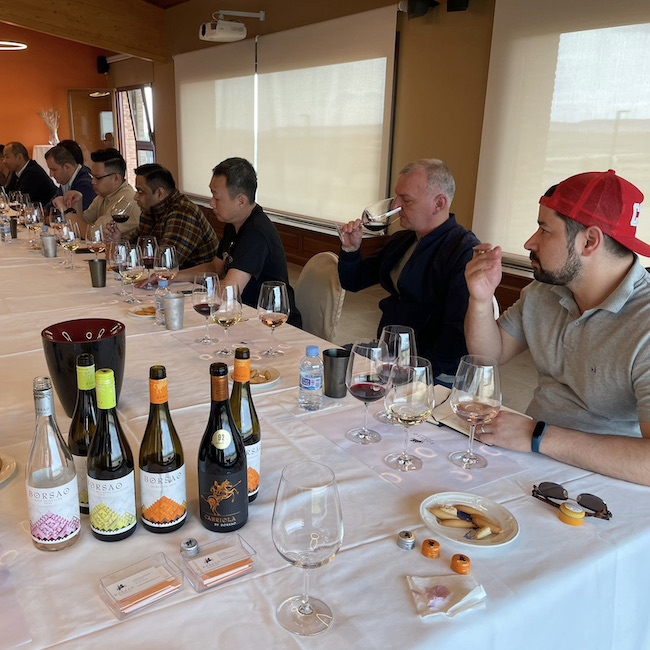
Day 3 in Aragón
The next day began with a visit to Naturuel, one of the region’s top producers of meat, including ham, which is 100% committed to sustainable production. Lunch was served there, too.
In the afternoon, the group headed to Manjares de la Tierra in Sarrión, Teruel, for a tour. The company specializes in growing, harvesting, and selling black truffles. Dinner was served at Rinconcico, in Rubielos, Teruel.
Third stop: Castellón de la Plana
The following morning, the group was able to enjoy the sights in Mora de Rubielos, followed by lunch at La Trufa Negra restaurant.
Afterwards, they traveled to Castellón de la Plana. The next day began with tourism around Peñíscola, followed by lunch at Casa Jaime. The afternoon included a visit to the Museum of the Sea and Peñíscola castle, and dinner was prepared by Michelin-star chef Miguel Barrera at Cal Paradís restaurant.
Over next two days, the group attended 5 sessions and workshops at Gasma, the Gastronomy and Management Campus at Cardenal Herrera University.
The topics addressed included Valencian rices: traditional recipes; haute cuisine tapas, with chef Javier Sanz from Michelin-star restaurant Cañitas Maite; canned products from Spain, with chef Jesus Segura from Casas Colgadas restaurant; haute cuisine rices made with different DO Valencia rices, with Jorge Lengua, named Best New Chef 2022; and a Valencian cheese tasting.
Omar Mahmoud Abdulaziz Alazzeh, Multi-Property Executive Chef from Marriott & Aloft Hotel in Riyadh, described the experience as “very positive” as it gave him the opportunity to get to know “cuisine from different regions.” He was most impressed by “the trip to Valencia, the city of rice! Every aspect of the rice culture there is incredible: the ingredients, the technique…” He’s returning to Riyadh with a paella recipe that he hopes to “start serving as soon as possible.”
Lunch was served at Gasma both days, and the group also enjoyed an olive oil and vinegar tasting from Avgvstvs Forvm and a session of Spanish beer and tapas pairings with Carlos Pinzano, of Deli_rant restaurant.
The next day, the group toured the Valencia Central Market, known for its fresh produce and rich and varied cuisine. Lunch was served at Central Bar by Ricard Camarena at the Market.
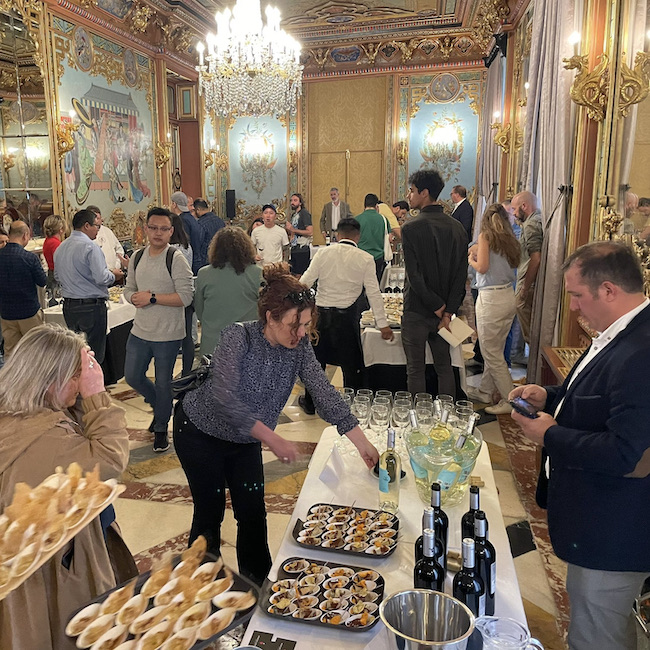
The group travels to Madrid
The participants then travelled back to Madrid for dinner and Madrid wines DO at Santoña Palace. The second-to-last day began with a tour of Mercamadrid followed by a visit to San Miguel Food Hall, in the city center. Sandra Acevedo, its director, was on hand.
The group then enjoyed a DO Cava wine pairing at Vinology, followed by a visit to the Galerías Canalejas Food Hall to learn about new gastronomic business models. A Galician dinner was served at Garelos restaurant, inside the food hall.
“Every aspect of the Hospitality Training Certificate is designed to show us the very best of Spanish gastronomy,” says Dione da Costa Pereira, Food and Beverage Supervisor from Hotel Grand Hyatt Sao Paulo. He was especially impressed by everything he learned about “Spanish wine, grapes, and the various regions,” with the result that now he can offer more wines at his hotel in Sao Paulo. He also said that, following this trip, the various types of “wine and extra virgin olive oils available at the hotel will increase, as will new ideas for their brunch, such as offering jamón ibérico.”
